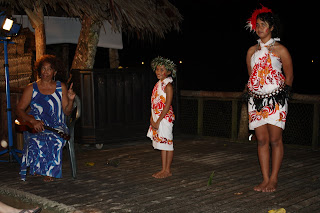 |
| No. This is not the Harbormaster |
 |
| Carved from a single tree |
The main
The people of
The Samoan social structure continues to be based on the extended family, and the Samoans cling tightly to their traditions. However, the influence of missionaries is also noticeably present in the islands. Activities other than church are highly discouraged on Sunday - a day when all businesses are closed. The influence of the missionaries is also present in the clothing worn by Samoans. Their dress is highly modest - especially for such a warm climate. Men wear long pants or lava-lavas, and women wear long skirts and cover their shoulders. It is common to see men in business suit jackets wearing a lava-lava rather than pants. Even the police uniforms are lava-lavas.
At first we did not care too much for
But we had many more pleasant surprises than disappointments, and our most pleasant surprise was the people. Our interactions with the local population have all been positive. We met some American folks that now live here and they spent a day driving us around and we took a small boat to an island where we did some hiking. Since they had 12 year old Meagan, Emily got a nice friend to enjoy.
 |
| Our Guide George on Aunuu Island |
 |
| Emily and Meagan |
They have a wonderful library here and the girls were befriended by Mary the librarian. Mary is full of tattoos and a sea-life mural tattoo completely covers her back. She loaned Emily her library card saving us the $50 fee and Emily checked out and read several books. Even the government officials were consistently pleasant and helpful.
 |
| Mary The best Librarian in Samoa |
 |
| Emily with the young dancer |
Another surprise was the beauty of the island. In the past, many boaters have reported the harbor to be intolerably filthy and polluted by the outflow from the canneries. That is largely cleaned up. The cannery outflow is pumped out a few miles offshore, and there is no noticeable inflow from the canneries. Yes, it is still quite fragrant when the wind blows just wrong, but the prevailing winds usually keep the odors away from the small boat anchorage. After two days at anchor we got permission to bring our boat alongside a concrete dock. This made town trips and walks to the local church for mass much easier. Emily got to ride her bike around too. We ended up staying two full weeks waiting for mail to catch up to us and the longer we stayed, the more comfortable we became.
 |
| Docked at low tide in Pago Pago |
 |
| The harbor may be dirty but is full of life |
And when you travel outside the town of
As we drove through individual villages, we were impressed by the large number of churches, fales (meeting houses), and graves. Each village had at least one church and fale, and most villages had many. In one village, it seemed that each house had a fale in front of it. And there are family burial sites in front of most houses. Some are more elaborate than others, but it appears that most families bury their dead in front of their houses. The local Rotarians (yes Uncle Joe, I still go to meetings) said that these family plots reinforce the permanence of land ownership to Samoans.
It is simple and inexpensive to get around without a car. There is a bus system that is efficient, colorful, and very user-friendly. Each bus is privately owned, and each is a reflection of its owner. The buses are built atop car bodies and the upper bus his made entirely of wood. Each bus has a unique paint job on its outside, but the real personality emerges on the dash and area surrounding the driver. Think of how some people personalize their work space with pictures, trinkets, and memorabilia. Add feather boas, artificial flowers, and loud music, and you can imagine one of the more sedate buses. They were wonderful! And we never paid a fare over $1.
We met a Samoan family and they were very friendly. Penitani (Benny) brought us free Papaya and gave Kim 6 natural white pearls he had found diving here. Kim made his wife Lisa some earrings and Emily gave the children stuffed animals. We agreed to deliver some food items to his parents in Tonga Tonga
 |
| Penitani, Lisa and kids |
 |
| Jo rides for the first time |
We went to a dinner one night at
 |
| Liquids on top in coconut shells |
 |
| Flying Fox |
Tom













